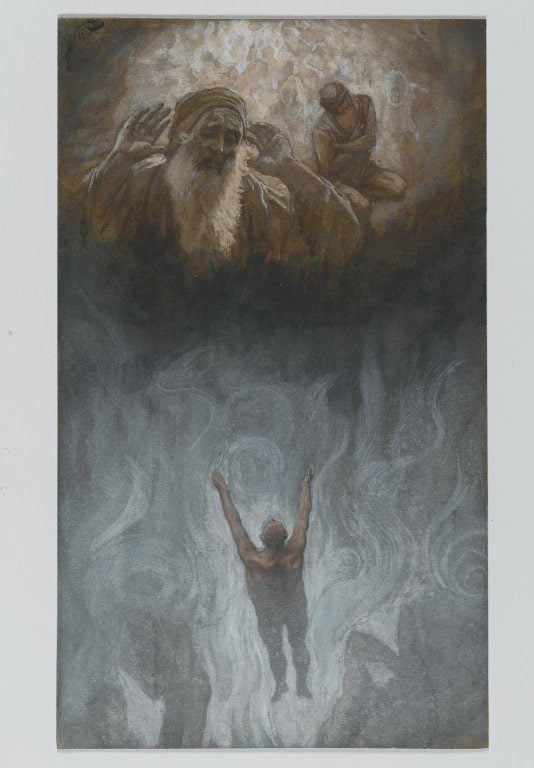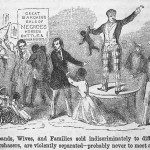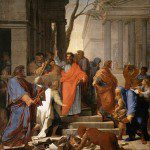
The Bad Rich Man in Hell, by James Tissot (1836-1902) [public domain / Wikimedia Commons]
***
(7-8-14)
***
Luke 16:24 (RSV) And he called out, ‘Father Abraham, have mercy upon me, and send Laz’arus to dip the end of his finger in water and cool my tongue; for I am in anguish in this flame.’
This is the Abraham of the Bible: long dead by that time, being asked to do something by a “rich man” (16:19, 22), traditionally known as Dives (which is simply a Latin word for “rich man”). His answer was, in effect, “no” (16:25-26). Thus failing in that request, he prays to him again for something else:
Luke 16:27-28 And he said, ‘Then I beg you, father [KJV: “I pray thee therefore, father”], to send him to my father’s house, [28] for I have five brothers, so that he may warn them, lest they also come into this place of torment.’
His request is again declined (16:29). So, like any good self-respecting Jew (Moses even “negotiated” with God), he argues with Abraham (16:30). But Abraham states again that his request is futile (16:31).
So, the next time anyone tells you that you can’t “pray to” or request intercession from a dead man, or anyone but God, show him this passage and let the fun begin!
It also shows (in a fascinating way) that not only can dead saints hear our requests, they also have some measure of power to carry them out on their own. Abraham is asked to “send” a dead man to appear to Dives’ brothers, in order for them to avoid damnation (yet another [potential] instance of dead men — like the prophet Samuel to Saul — communicating to those on the earth). Abraham doesn’t deny that he is able to potentially send Lazarus to do such a thing; he only denies that it would work, or that it is necessary (by the logic of “if they don’t respond to greater factor x, nor will they to lesser factor y”).
Therefore, it is assumed in the story that Abraham could have possibly done so on his own. And this is all told, remember, by our Lord Jesus. It is disputed whether it is a parable or not (several textual factors suggest that it is not; e.g., parables do not use proper names), but even if it is, it nevertheless cannot contain things that are untrue, lest Jesus be guilty of leading people into heresy by means of false illustrations or analogies within His common teaching tool: the parable.
***
Exchange on Facebook friend John Edwards’ public share of this post:
James Jay Austin [Reformed Baptist]: Parables are hypothetical stories Christ used to make His points as well as cloak them from being understood by those that it wasn’t intended for…. This argument won’t work because they were both dead talking to one another so its not a prayer but a discourse…. Ground control to John come back from outer space my man…
Matt. 6:6 But YOU, when YOU pray, go into your inner room, close your door and pray to your FATHER who is in secret, and your FATHER who sees what is done in secret will reward you.
This is only place Christ taught us peons how to pray as well as to whom…. (that i know of)
It’s irrelevant to note the usual purpose of parables: to confirm the blind in their blindness and disobedience, etc. They still cannot contain false principles or false illustrations: things cannot be done in parables that are forbidden in actual life. This is Jesus teaching!
Whether Dives was dead or not is also irrelevant to the argument at hand, since standard Protestant theology holds that no one can make such a request to anyone but God. He’s asking Abraham to send Lazarus to him, and then to his brothers, to prevent them from going to hell. That is very much, prayer: asking for supernatural aid from those who have left the earthly life and attained sainthood and perfection, with God.
Quibbling about whether it was a parable (an argument that fails, anyway, as shown) or whether the requester was dead does not allow Protestants to escape the internal difficulties for them, as mentioned.
Nor does this argument [from Matthew 6:6] prove your point. Taken absolutely, it would exclude prayer to Jesus, yet St. Stephen prays to Jesus, as he is being martyred (Acts 7:59). Thus, it doesn’t exclude that, and logically, it doesn’t exclude asking for the intercession of others, alive or dead.
Jesus also taught us to pray, of course, with the Lord’s Prayer (Our Father . . . ).
Protestant theology teaches that we can’t talk to anyone who is dead, let alone make intercessory requests to them. Yet Saul talked to the dead Samuel, Moses and Elijah appeared at the Mount of Transfiguration, the “Two Witnesses” of Revelation come back to life again (and talk to folks), etc.
Mr. Armstrong if you could please show a scriptural reference as to Christ teaching us to pray to Steven or Ezekiel etc. so that I may be able to better understand…..
Jesus told this story, and in the story is a guy praying to a dead man, to request things that the dead man appears to be able to fulfill by his own powers. That is quite sufficient to prove the point. It IS the teaching of our Lord Jesus, and you must reckon with that. So far, your arguments have failed to establish the points you are trying to make, which are assumed in Protestant theology (but contrary to this passage and others).
Hence the cloak.
Above you argued that Jesus taught that only the “Father” can receive prayer, but I already disproved that by showing that Stephen prayed to Jesus in inspired Scripture. Your ultra-literalism in interpreting the Bible ain’t workin’ . . .
Bill Gray: The fallacy of your argument using Luke 16:19-31 is that it does not represent a believer in this world praying to someone other than God.
The rich man in that Scripture passage is dead, as are Abraham and Lazarus. So, yes, after death, when Lazarus and Abraham were in the same Hades/Paradise (later to be relocated to Heaven/Paradise) — they have communion, i.e., can talk — just as we will be able to talk with our family and friends in heaven after we die.
And, while still in Hades, obviously they could communicate with the rich man who was in Hades/Torment, the other side of Hades.
That in no way justifies anyone still alive in our mortal bodies praying to those who have already died and are in heaven or hell. We still have only One Mediator between man and God — Jesus Christ. No mediatrix, no saints — just Jesus Christ.
So, your argument is built upon sand.
My argument did not have to do with “a believer in this world praying to someone other than God.” One must understand that which he is critiquing, before setting out to refute it. My argument is in my title:
[when I was interacting with this person, my original title was: “In the Bible, Does anyone Ever Ask [“Pray To”] a Dead Man to Intercede or Intervene to Fulfill a Request?”]
The answer, as proven in Luke 16, is yes.
It remains true that Protestant theology, generally speaking, forbids asking a dead man to intercede (thus, a dead man asking this is part of the larger category that remains forbidden in that theology), and makes prayer altogether a matter only between man and God. You stated it yourself (as one such good and sincere Protestant):
Here (in the inspired revelation of Scripture, in a teaching story given by our Lord Jesus), Abraham is functioning as a mini-mediator. He is being asked to accomplish certain things. An intercessory request was made of him, not God.
In fact, God is never mentioned in the entire story (!!!); whereas according to you, He certainly ought to have been, because you falsely claim that there is no mediatorial function for dead saints helping us get to God or to fulfill any (moral / good) request of ours.
So why did Jesus teach in this fashion? Why did He teach that Dives was asking Abraham to do things that Protestant theology would hold that only God can do? And why is the whole story about him asking Abraham for requests, rather than going directly to God and asking Him: which would seem to be required by your theology?
But instead, God is not mentioned at all in the story.
No one can deny the exact assertion I have made here, and it’s proof from the Bible: though it is in tension with Protestant theology. I yield to the Bible over men’s traditions any day. We mustn’t allow our theology to contradict the inspired, infallible Bible.
Praying to the dead is strictly forbidden in the Bible. Deuteronomy 18:11 tells us that anyone who “consults with the dead” is “detestable to the Lord.” The story of Saul consulting a medium to bring up the spirit of the dead Samuel resulted in his death “because he was unfaithful to the LORD; he did not keep the word of the LORD and even consulted a medium for guidance” (1 Samuel 28:1-25; 1 Chronicles 10:13-14). Clearly, God has declared that such things are not to be done.
This assumes that all such communication between those in heaven and those on earth is occultic and forbidden (divination, seers, mediums, necromancy, etc.). But it is not, and I explain why here: “Invocation of the Saints = Necromancy?”
You have to explain why the prophet Samuel appeared to tell Saul of his impending death. This was the real person, not a fake demonic spirit. Jesus and Peter both talked to dead people when they raised them, too.
You also distorts the story of Samuel and Saul:
1) It’s true that consulting a medium was a forbidden practice, but you ignore that fact that the real Samuel actually appeared and foretold Saul’s death. Thus, even though he was wrong in how he tried to communicate to him, God does not forbid all interaction between dead men in heaven and those on earth, as proven by this and other passages such as what happened on the Mount of Transfiguration.
2) It’s not true that Saul died because he consulted a medium (though he was dead-wrong to do so). The very text cited proves this; where the prophet Samuel tells him exactly why he is to be judged and will die:
1 Samuel 28:18-19 (ESV) Because you did not obey the voice of the Lord and did not carry out his fierce wrath against Amalek, therefore the Lord has done this thing to you this day. [19] Moreover, the Lord will give Israel also with you into the hand of the Philistines, and tomorrow you band your sons shall be with me. The Lord will give the army of Israel also into the hand of the Philistines.”
Bill cited an article that states: “So, in order for a dead person to receive prayers, the dead individual has to hear the prayer, possess the power to answer it, and know how to answer it in a way that is best for the individual praying.”
Well, that’s fascinating, isn’t it?, in light of what I have already noted. How is it that in Jesus’ own story, Abraham can:
1) hear Dives’ prayer.
2) is capable of answering it on his own (by sending Lazarus to five brothers on earth, to warn them), and;
3) know how to answer the prayer. He does this by refusing two different requests (in the second instance, using reasoning very similar to Jesus’ elsewhere: His statements about the seeking of signs and miracles).
And, as I also noted, God is never mentioned in the entire story. It’s all about Dives asking / praying to Abraham for two different requests.
Folks, this just ain’t how it’s supposed to be, from a Protestant perspective. All the emphases are wrong, and there are serous theological errors, committed by Jesus Himself (i.e., from their perspective). That should be enough to raise the red flags for any serious Christian who believes in biblical inspiration and the deity of Christ (both of which dictate that no such error can possibly exist).
When that happens, I’ll follow the Bible rather than men’s traditions that conflict with it, every time.
Whether Luke 16 is a parable or not, does not allow Protestants (by commonly held beliefs about parables) to escape the difficulties here for them. Arguably, my contention is even stronger if it is a parable, for in a non-parable, stating historical facts, a person could do or say something theologically incorrect.
But in a parable taught by an omniscient Jesus, Who is God, in an inspired, infallible revelation, falsehood could not be “enshrined.” Jesus is teaching His hearers something, and it can’t be a falsehood or contain theological error, since arguments by analogy (basically what the parables are) must be true analogies. My view, however, is that it is not a parable, and that Jesus uses the account in order to teach certain things (it illustrates what He wishes to teach). Parables don’t have proper names: let alone that of a familiar figure like Abraham. I don’t recall any other parables being set in Hades / Sheol, either. They are usually quite “earthy”: using agricultural and master / servant word pictures. Parables also usually are prefaced by a statement (usually by the Bible writer, not Jesus) that the following words are a “parable”.
The main point, of course, is “you cannot serve God and mammon”: which he stated six verses before He began this story (and implied also: “the last shall be first and the first, last”); also, that hardness of heart is not overcome even by extraordinary miracles.
Secondary to the points He wishes to make (but no less true in principle) is the fact that a dead man could be prayed to (rather than God) for a request. And the dead man (in this case, the historical person, Abraham) could answer requests on his own (though no doubt by God’s power). God isn’t mentioned in the entire story, which runs 13 verses.
This is the whole point I am utilizing it for, for my present apologetics purposes, and nothing brought forth by our two Protestant friends who disagree with my conclusion, overthrows my conclusion. Not even close: they haven’t yet touched it at all. The burden of those who disagree is to interact with the biblical arguments I made (including my linked paper about communion of saints not being necromancy or occultic). My entire argument was biblical from start to finish.
*****
Meta Description: Jesus’ story of Lazarus & Abraham (Lk 16) shows that we can ask dead men (i.e., beings other than God) to fulfill intercessory requests.
Meta Keywords: afterlife, hades, intermediate state, Lazarus and Abraham, netherworld, purgatory, sheol, communion of saints, intercession of the saints, invocation of saints, Prayer, praying to saints, prayer to a dead man













